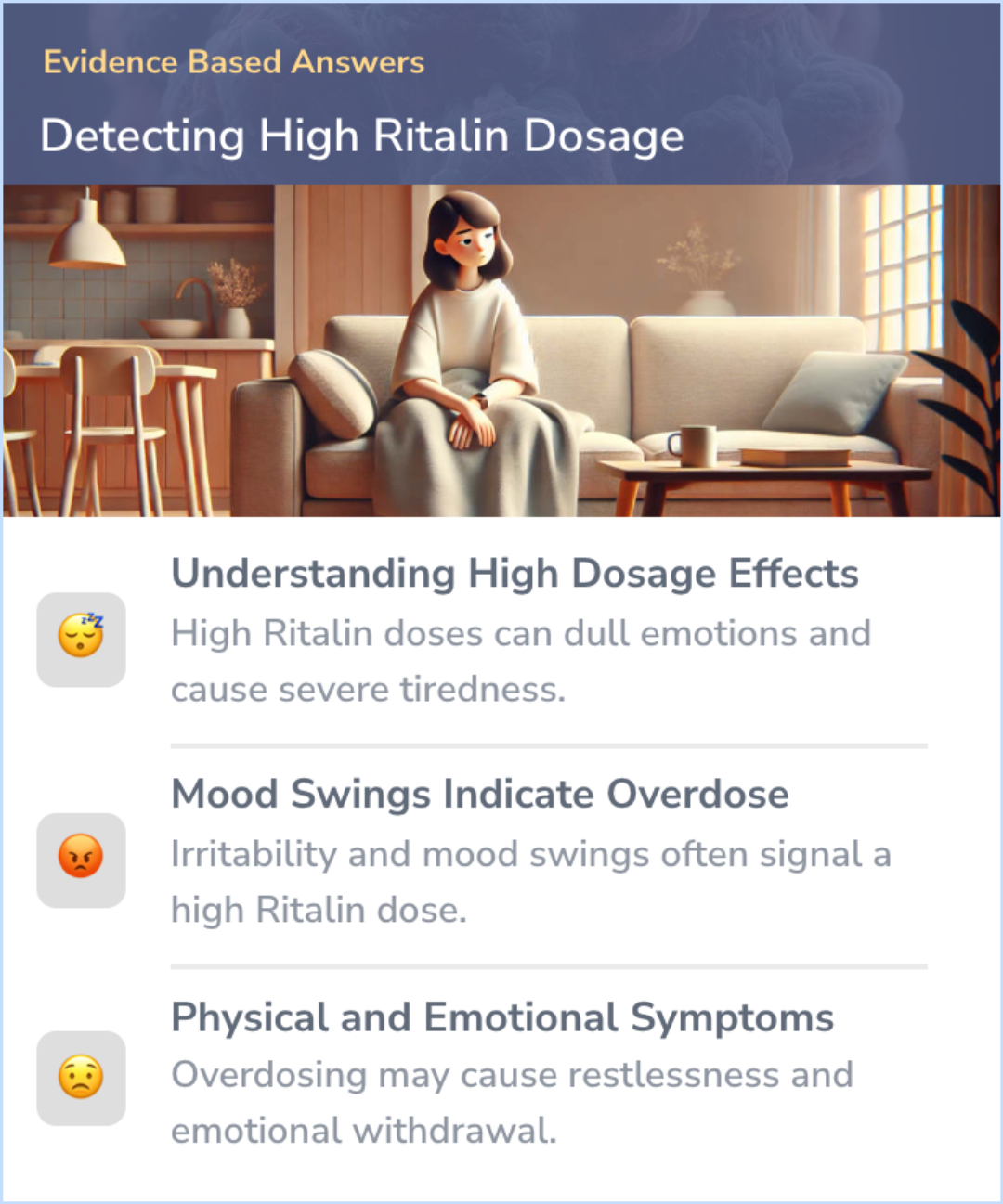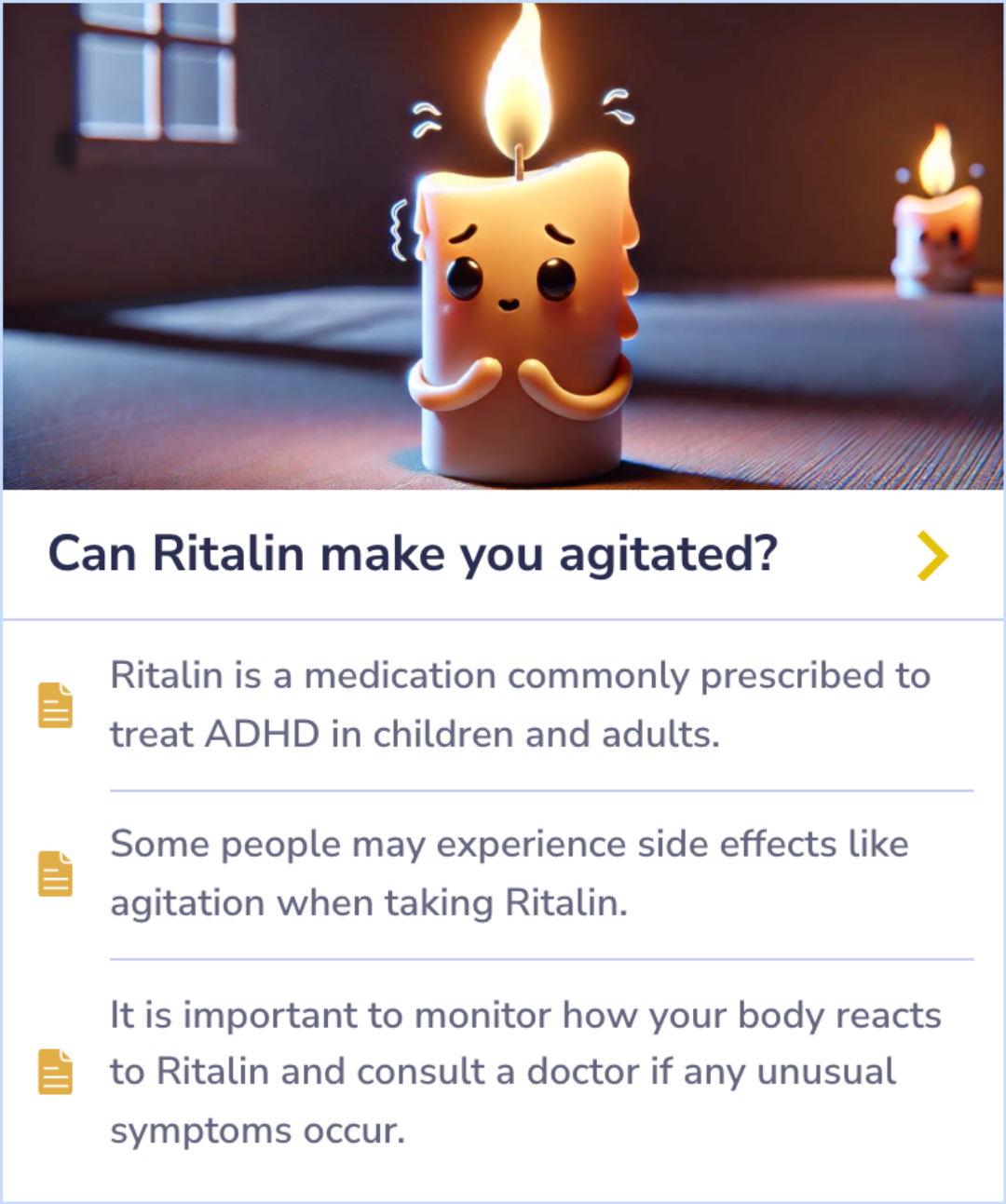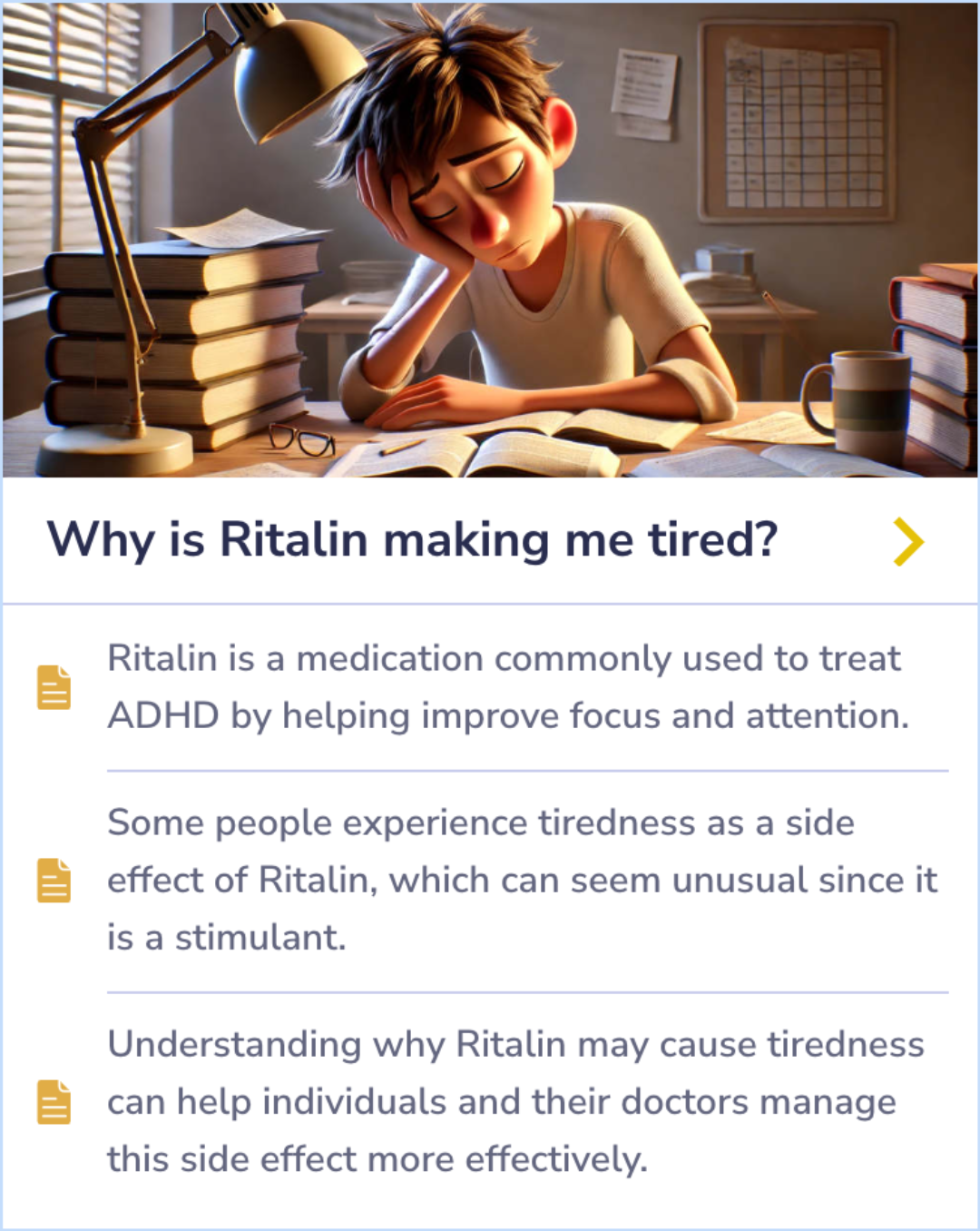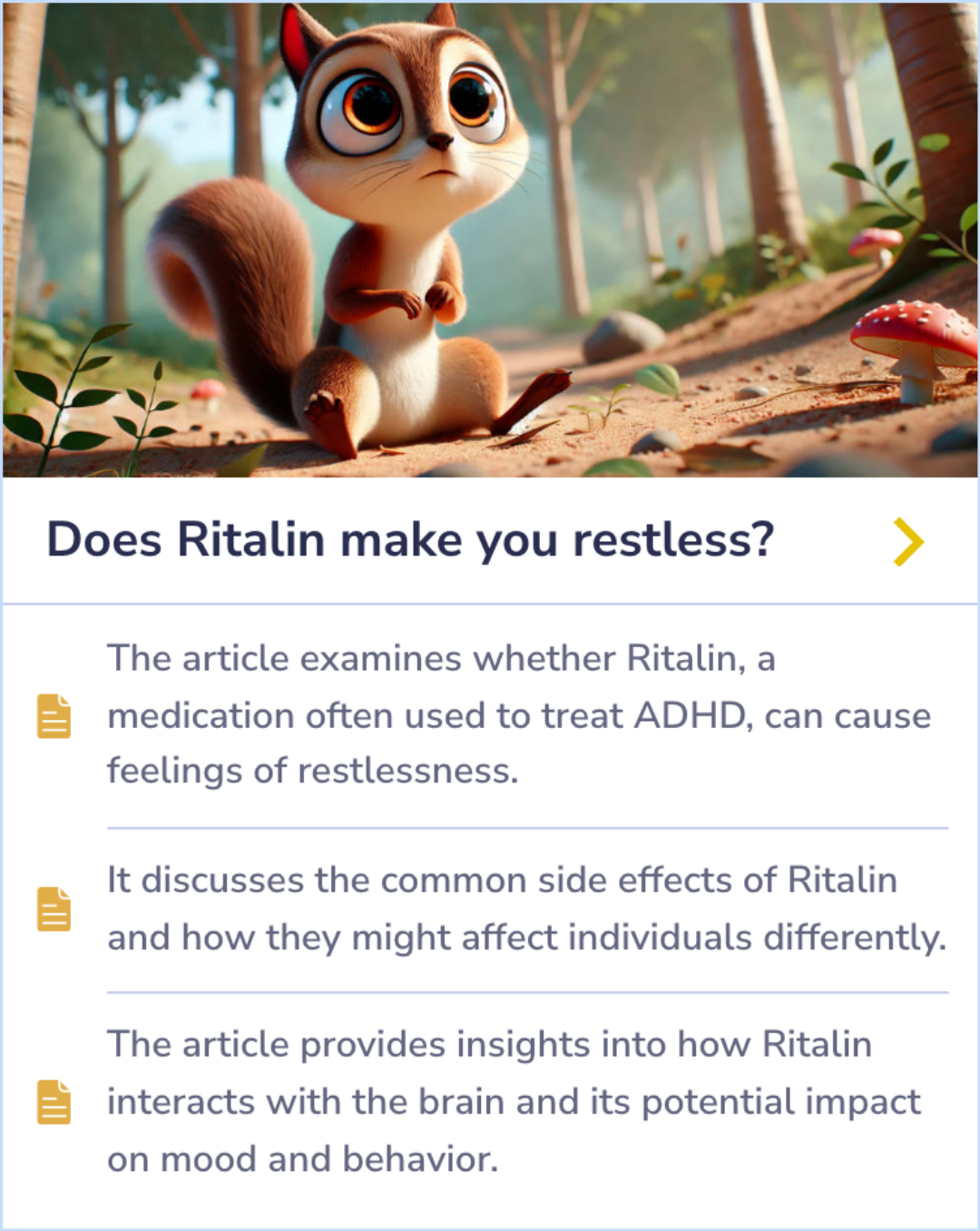Light
Evidence Based Answers
How do you know if Ritalin is too high?
Symptoms like moodiness, tiredness, and emotional shifts can signal high Ritalin doses. Physical signs include restlessness and sleep issues, while behavioral signs include being withdrawn.
Published: November 20, 2024
Click to explore a section:

High Ritalin doses cause moodiness, tiredness, and emotional shifts.
Personal Experiences
Perspectives: Finding the Right Dose
In discussions on Ritalin doses, people highlighted signs of overdosing, from heightened irritability and hyperfocus to physical discomfort like headaches and sleep disturbances. Others stressed the importance of personalized dosing and keeping track of symptoms.
Reddit: u/gibagger
Ritalin dosage is not gender or bodyweight dependent... If it's too much, you will likely notice some unpleasantness.Recognizing Effects of High Ritalin Dosage
High doses of Ritalin can lead to effects such as reduced emotional responsiveness, extreme tiredness, and limited reactions to surroundings. These symptoms often come from excessive stimulation of the central nervous system.
Other warning signs include mood changes or difficulty managing emotions, which may require attention to avoid further complications.
Other warning signs include mood changes or difficulty managing emotions, which may require attention to avoid further complications.
“
Source Quotes:
Patients are more prone to become easily agitated, irritable, or depressed and go through mood swings/lability.
Nervousness and insomnia are the most common adverse reactions but are usually controlled by reducing dosage and omitting the drug in the afternoon or evening.
Mood Changes and Signs of Excessive Dosage
Mood swings and irritability can signal that the Ritalin dosage may be too high. Symptoms like increased restlessness and emotional instability are common indicators of excess dosing.
Many individuals report feeling tense or struggling to control their emotions when their dose surpasses the optimal level.
Many individuals report feeling tense or struggling to control their emotions when their dose surpasses the optimal level.
“
Source Quotes:
Patients are more prone to become easily agitated, irritable, or depressed and go through mood swings/lability.
Moodiness/irritability (50 versus 29 percent), appetite suppression (38 versus 7 percent), and difficulty sleeping (21 versus 11 percent).
Recognizing Physical and Behavioral Signs of Overdosage
Excessive Ritalin doses may lead to physical symptoms like hyperactivity, restlessness, and trouble sleeping. Behavioral signs can include heightened irritability or becoming emotionally withdrawn.
Adjusting the dosage can help ease these symptoms and lower the risk of more severe effects.
Adjusting the dosage can help ease these symptoms and lower the risk of more severe effects.
“
Source Quotes:
The most common adverse effects on methylphenidate itself are insomnia, decreased appetite, bodyweight loss, abdominal pain, headache, irritability, anxiety and proneness to crying.
Signs and symptoms of acute overdosage, resulting principally from overstimulation of the central nervous system and from excessive sympathomimetic effects, may include...agitation, tremors, hyperreflexia.
Adjusting High Dosage Side Effects
Reducing the Ritalin dosage may relieve side effects such as anxiety, irritability, and more severe symptoms if they appear. Prompt adjustments can increase comfort and improve overall safety.
Being attentive to any behavioral or emotional changes is important to prevent adverse effects.
Being attentive to any behavioral or emotional changes is important to prevent adverse effects.
“
Source Quotes:
The most common adverse reactions in double-blind clinical trials (>5%) in adult patients were decreased appetite, headache, dry mouth, nausea, insomnia, anxiety, dizziness, weight decreased, irritability, and hyperhidrosis.
If paradoxical aggravation of symptoms or other adverse effects occur, reduce dosage, or, if necessary, discontinue the drug.
Key Takeaways
Conclusions
High Ritalin doses often trigger symptoms like reduced emotional responsiveness and mood changes, originating from excessive central nervous system stimulation.
Notable indicators include irritability and difficulty managing emotions, suggesting that trouble sleeping and hyperactivity might coincide with high dosage levels. Addressing these symptoms promptly by adjusting the dosage could lead to improvement.
Notable indicators include irritability and difficulty managing emotions, suggesting that trouble sleeping and hyperactivity might coincide with high dosage levels. Addressing these symptoms promptly by adjusting the dosage could lead to improvement.

Evidence Summary
Monitoring Reactions to Ritalin
Ritalin is a widely used medication for ADHD, yet it can lead to side effects like agitation in some individuals. Monitoring how you feel while taking Ritalin is key, as noticing unusual symptoms can help you and your healthcare provider make necessary adjustments.
Being aware of your body’s reactions is essential. If agitation or other unexpected symptoms arise, reaching out to a doctor can ensure you receive the best care while managing your ADHD effectively.
Being aware of your body’s reactions is essential. If agitation or other unexpected symptoms arise, reaching out to a doctor can ensure you receive the best care while managing your ADHD effectively.
Evidence Summary
Unexpected Tiredness from Ritalin
Ritalin is prescribed to improve focus and attention in individuals with ADHD. Despite being a stimulant, it can lead to unexpected tiredness in some users, a side effect that may seem contradictory to its intended purpose.
While enhancing focus, certain individuals experience fatigue, highlighting the diverse responses to the medication. Exploring this helps patients and healthcare providers navigate daily challenges more effectively.
While enhancing focus, certain individuals experience fatigue, highlighting the diverse responses to the medication. Exploring this helps patients and healthcare providers navigate daily challenges more effectively.
Evidence Summary
Ritalin and Its Effects on Restlessness and Mood
Ritalin, often prescribed for ADHD, can sometimes cause restlessness as a side effect. The drug’s influence varies, with some users experiencing mood shifts and behavioral changes. These differences highlight how Ritalin interacts with the brain in unique ways for each person.
Side effects can range widely, and understanding how these manifest offers a glimpse into how medications like Ritalin shape day-to-day experiences and mood stability for users.
Side effects can range widely, and understanding how these manifest offers a glimpse into how medications like Ritalin shape day-to-day experiences and mood stability for users.


